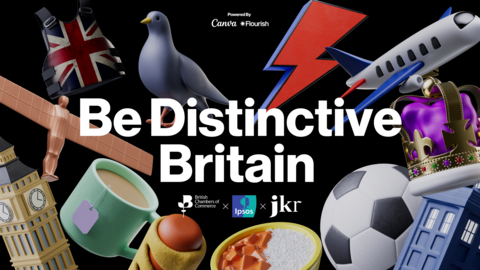- 52% of UK exporters say Britain's brand helps boost their sales: More than half see their association with Britain as a key driver of growth.
- 1/3 of consumers seek out British brands: Despite global competition, the desire to buy British remains a draw for a good portion of the public.
- 43% rise in Brand Closeness: Brands tapping into British associations see a 43% increase in consumer connection, proving the power of national ties.
- Brand Britain is seen as traditional, enduring, and witty: Despite challenges, these traits continue to define Britain in the minds of consumers.
‘Brand Britain’: Down, But Far From Out. New Report Unveils Its Enduring Distinctiveness.
Steve Partridge – British Chambers of Commerce
s.partridge@britishchambers.org.uk
David Pearson – British Chambers of Commerce
d.pearson@britishchambers.org.uk
Laura Lyman – JKR
lauralyman@jkrglobal.com
Mackenzie Horn - Ipsos
mackenzie.horn@ipsos.com
Brand Britain is still valued by both business and the public, despite an increasingly competitive global landscape, according to a landmark report by global branding agency Jones Knowles Ritchie (JKR) and market research organisation Ipsos, in partnership with the British Chambers of Commerce (BCC). Research from the report presented by data visualisations powered by Flourish, part of Canva – the global visual communication platform.
This press release features multimedia. View the full release here: https://www.businesswire.com/news/home/20241024502057/en/

JKR, Ipsos, and the BCC's “Be Distinctive Britain” report explores what sets Brand Britain apart today and how this distinctiveness shapes its brands, businesses, and people. (Graphic: Business Wire)
The “Be Distinctive Britain” report dives deep into the state of Brand Britain today, examining what makes the nation distinctive and how this influences the brands, businesses, and people tied to it. By treating Great Britain as a brand in its own right — similar to global names like Apple, British Airways, or Coca-Cola — the study uncovers the key elements that set the country apart, from its cultural reputation to its economic influence.
The report taps into the perceptions of over 3,000 members of the British public and 1,100 UK business leaders, offering a comprehensive view of how Brand Britain is viewed in both domestic and global contexts. Through these insights, the study explores whether the nation has maintained its distinct edge or whether this identity is at risk of fading, and what this means for the future of British business and international image.
“It’s essential for any brand to understand how they’re perceived by their audience, and that holds just as true for a nation as it does for any company,” explained Lee Rolston, Chief Growth Officer at JKR. “This report reveals that Britain’s cultural influence is at the heart of its global image and economic success. The British public is united in identifying the key attributes that define Great Britain — traditional, enduring, and witty — across all age groups and demographics. If brands want to leverage the power of Brand Britain, whether based in the UK or connected to it, they must ensure that the experiences they create align authentically with these attributes and the broader 'Brand Britain' identity.”
THE BUSINESS VIEW.
In a survey by the BCC of more than 1,100 business leaders, over half of responding firms who export (52%) believe Brand Britain helps drive business growth. Only 11% of exporters say the brand hinders their organisation. The figures for non-exporting firms are understandably slightly lower – with 23% of businesses saying the brand helps them to grow and increase sales, with 8% saying it has a negative impact.
The UK is cited the most times by companies as the best place to do business in, invest in and as making the most innovative products. Meanwhile, Germany is cited the most by business for making the highest quality products – and the USA for having the most recognisable brands.
Over half of firms (56%) think that the UK is best known for its history around the world. Other cultural traits are also cited highly by firms – with 35% saying arts and culture play a big part in Brand Britain, while 34% identify tourism as significant.
Businesses see Britain’s culture as a driving force of influence around the world. Around two thirds (64%) of firms think Britain has cultural influence globally, while less than half think the country has an impact politically (44%) or economically (42%). Looking ahead over the next 20 years most businesses think the UK’s influence will be reduced – although over half (53%) still think the country will have significant cultural influence in the decades to come.
"Despite recent challenges, Brand Britain still packs a punch for UK businesses, particularly those who export,” said Shevaun Haviland, Director General of the British Chambers of Commerce. “If firms understand how to collectively harness its power, then it can continue to have extraordinary influence. Companies are clear that the nation’s history, culture, and reputation for innovation are key drivers of growth and global recognition. Moving forward policymakers need to work with businesses of all shapes and sizes to capitalize on the benefits of the British brand. By working together, and using the Government’s new industrial strategy, we can leverage our competitive advantage and make sure the UK is the best place to start, grow and invest in business.”
THE PUBLIC VIEW.
Research by Ipsos, which tested 60 iconic brands like Burberry, Cadbury, Gregg’s and Dr. Martens reveals that Brand Britain still holds strong in consumers' minds. Over a third (35%) of respondents said they would go out of their way to buy British brands. Additionally, 59% believe Great Britain produces high-quality brands, 69% trust British brands, and 70% say they feel good about purchasing them.
Indeed, 39% of those surveyed said they would be prepared to pay more for brands from Britain.
The research highlighted slight generational differences with older consumers more favourable to British brands. 77% of ‘Baby boomers’ say they’d feel good about buying British, while the figure for Gen Z is 66%.
Those surveyed have a clear idea of what Brand Britain means. 47% see Britain as traditional, 19% enduring and 16% witty, and these statements most differentiate Britain vs other countries researched. Other popular personality traits cited include trustworthy, friendly, helpful, welcoming and generous.
The majority of the British public surveyed—55%—said they felt good about the country with 45% believing it to be reliable as a country. The responses by age show clear differences – with 61% of so-called Baby Boomers feeling positive, while only half of Gen Z consumers feel similar (48%).
Lucy Burnham, UK Head of Brand Research at Ipsos, said: "Our new report reveals Brand Britain's resilience in a competitive global market. It's not just nostalgia; it's a tangible asset. Over half of UK exporters see 'Brand Britain' boosting sales, and over a third of consumers actively seek out British products. British Brands that successfully tap into these British associations see a 43% increase in the emotional connection consumers have with their brand, building stronger brand relationships. This demonstrates the continued power of Britain's image as traditional, enduring and witty. While the report highlights some generational nuances in how the brand is perceived, the overall message is clear: 'Brand Britain' remains a potent force for businesses and a source of pride for the public.”
KEY TAKEOUTS.
The report concludes with three key takeaways for building the distinctiveness of Brand Britain: Be Confident, Be Yourself, and Be Culture-First. It highlights that Britain retains unique brand strengths, largely rooted in its rich history and culture, which set it apart from other nations. These learnings on cultivating distinctiveness can serve as a framework for other brands and countries alike, offering insights into how any entity can leverage what makes it unique to stand out.
The full “Be Distinctive Britain” report, created by Ipsos and JKR, is now available: https://bedistinctivebritain.jkrglobal.com/. To find technical notes, please go to page 102 of the report.
View source version on businesswire.com: https://www.businesswire.com/news/home/20241024502057/en/










